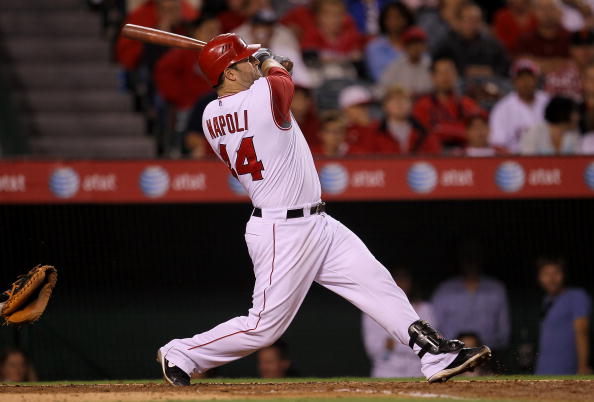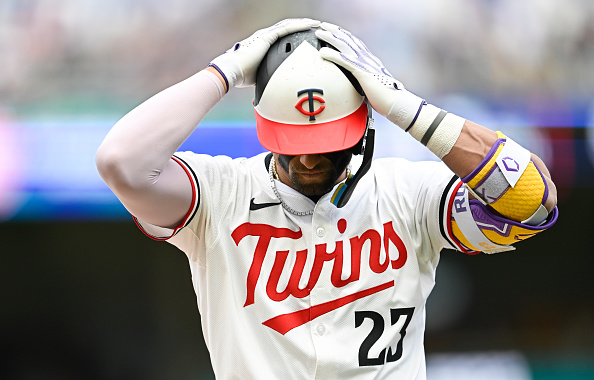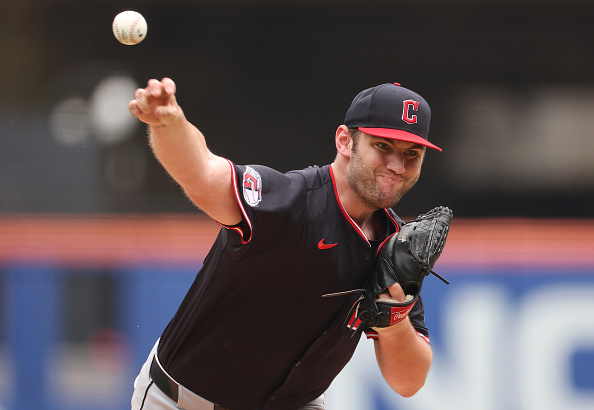As the 2021 Angels prepare to embark on their diamond anniversary, we are beginning the year celebrating the top sixty players in the sixty-year history of the franchise.
The list has been compiled based on an unbiased HaloLife formula. Taken into account are Fangraphs and Baseball Reference WAR ratings, awards voting, All-Star and post season appearances and other factors. These rankings are strictly based on the performance solely during each player’s Angels career and does not reflect overall career performance. Years outside of their tenure in Anaheim or Los Angeles or the personal opinion of the author are not reflected.
You can read the previous list of player rankings 56-60 and 51-55 here.
This week we countdown the 46-50th greatest Angels all time.
50. Orlando Cabrera
Following the 2004 season, leadoff hitter and fan-favorite David Eckstein departed as a free agent for the St. Louis Cardinals. The Angels filled that hole at shortstop with 30-year-old former Expos veteran and slick fielder Cabrera. The Columbian-born infielder would more than fill Eckstein’s position adequately, playing Gold Glove caliber defense in addition to providing solid production at the plate. During his years in Anaheim, he hit to the tune of .281 and had a .331 on-base percentage.
Cabrera would compile the third-best Fangraphs defensive WAR among shortstops and fifth-best defense at all positions in baseball during his Angels career. It reached a pinnacle in 2007 with a Gold Glove award and career-best .301 average, slotting in at No. 15 in American League MVP voting. Cabrera would prove to be a solid weapon on the basepaths, consistently testing outfielders’ arms in addition to swiping 20 or more bases all three seasons with the Halos.
He would be the starting shortstop in three postseason series for Los Angeles and hit a home run in the 2005 ALCS against the eventual world champion Chicago White Sox. Cabrera would finish his MLB playing career after 15 seasons in the majors with his time in Anaheim resulting in a .281/.331/.389 slash with 108 doubles, 25 home runs, and 68 stolen bases.
49. Geoff Zahn
A 35-year-old veteran starter of eight MLB seasons, Zahn signed a free agent contract with the California Angels in December 1980 after coming off four straight seasons of 12 or more victories with the Minnesota Twins. The left-handed pitcher would finish the strike-shortened 1981 season with 10 victories and 4.41 ERA before returning for a career year in 1982. During that high water mark campaign, he led the Angels pitching staff with an 18-8 record to go with his 3.73 ERA. Zahn had 4 shutouts and 12 complete games for the AL West division-winning Halos that season.
While the Angels would be defeated in the 1982 ALCS by the Brewers, the former Michigan Wolverine would return to collect 9 wins with a 3.33 ERA in 1983 and 13 victories with a 3.12 ERA and a league-leading 5 complete game shutouts in 1984. Zahn’s MLB career would end with seven starts on the 1985 Angels pitching staff.
He would end his playing days with the Angels 52-42 and totaling a 3.64 ERA across 123 games (121 starts) with the California Angels. At the time of his retirement, Zahn ranked top-10 in franchise history in wins, starts, innings pitched, complete games, and shutouts. His 13 shutouts with the Halos remains sixth-best all time after sixty years.
48. Mike Napoli
As Angels fans awaited the arrival of catcher-of-the-future in prospect Jeff Mathis, it was another backstop from Florida that was preparing himself for that role in Anaheim. The 6-foot-1, 225-pound Napoli rose the ranks in the farm system about a level behind the aforementioned Mathis and eventually surpassed him on the catching depth chart.
While Mathis held superior defensive skills behind the dish, Napoli’s bat would win the battle for playing time as he averaged a home run every sixteen at-bats during his five seasons with the Angels. Napoli would have three straight seasons of 20 or more homers between 2008 and 2010 before being dealt to Toronto in exchange for Vernon Wells.
Anaheim was just the beginning for Napoli’s career, but he hit .251 with 92 home runs, and 249 runs batted in during his playing days for Mike Scioscia’s Angels. He played seven more seasons and appeared in three World Series with three different clubs, including a championship with the 2013 Boston Red Sox. In his career, Napoli hit 8 postseason home runs, including 2 in the World Series.
47. Fred Lynn
January 23, 1981 the California Angels traded Frank Tanana, Joe Rudi, and Jim Dorsey to the Red Sox for Steve Renko and 6-time All-Star outfielder Lynn. The blockbuster trade gave the Angels a superstar centerfielder and returned the 29-year-old Lynn to his native Southern California, where he won three straight College World Series for USC in the early 1970s.
Lynn started off the 1981 season hitting .274 before suffering a knee injury that forced him to miss time and effected his hitting the remainder of the season. In his second season with the Angels, he joined Rod Carew, and Don Baylor, and newcomer Reggie Jackson as a quartet of former AL MVPs in the Halos potent lineup. Lynn would not disappoint. He batted .299 and had 38 doubles, 21 home runs, and 86 runs batted in for the Western Division winning club.
Lynn had his ninth consecutive All-Star season in 1983 and would become the first and only player to hit a grand slam in the midsummer classic at Comiskey Park. He made highlight-reel plays in center field. Included, the famous ‘crashing into the walls’ highlight collision and catch with left fielder Brian Downing that was featured in the credits of every weekend’s edition of This Week in Baseball. Lynn left the Angels to join the Baltimore Orioles following the 1984 season, concluding his days wearing a Halo. He hit .271/.358/.464 with 94 doubles, 71 home runs, and 270 runs batted in across four campaigns in Anaheim.
46. David Eckstein
The Angels struck gold when they grabbed the diminutive middle infielder off waivers from the Red Sox in the summer of 2000. Eckstein took hold of his new opportunity, hitting .346 the remainder of the Triple-A Edmonton Trappers season before earning the Angels starting shortstop duties the following spring. The blonde-haired leadoff hitter would hit .285 with a .355 on-base percentage. Eckstein led the league with 21 hit-by-pitch and 16 sacrifice hits while finishing 4th in AL Rookie of the Year voting behind Ichiro Suzuki, C.C. Sabathia, and Alfonso Soriano.
It was during his sophomore season he became known as “The X-Factor” as he hit .296, again leading AL in being plunked by pitches and sacrifice hits. Eckstein led an Angels lineup to their first postseason in 16 years. In one April series hosting the Toronto Blue Jays, the 5-foot-6 Eckstein clobbered two grand slams that propelled the Angels into a hot streak and was later viewed as a catalyst moment for the World Series championship-bound ballclub.
Eckstein carried that spark into the postseason, scoring nine runs during the 2002 postseason, including a World Series with a .310 average and 6 runs scored. He would leave the Angels for St. Louis following the 2004 season with .278 average, 82 stolen bases, and 76 times hit by pitch and earn another World Series title and series MVP for the 2006 St. Louis Cardinals.
We will next countdown the 41st through 45th greatest Angels all-time discussing a baseball son, sibling, and a couple players that might surprise fans they made the list.
Check us out on our socials:
Twitter: @PTSTNews and @TalkPrimeTime
Facebook Page: Prime Time Sports Talk
Join our Facebook Group: Prime Time Sports Talk
Instagram: @ptsportstalk
Follow B.J. Martin on Twitter @_HaloLife
Main Image Credit:
Embed from Getty Images








One Response